
Oh boy, I get to write about Giant!
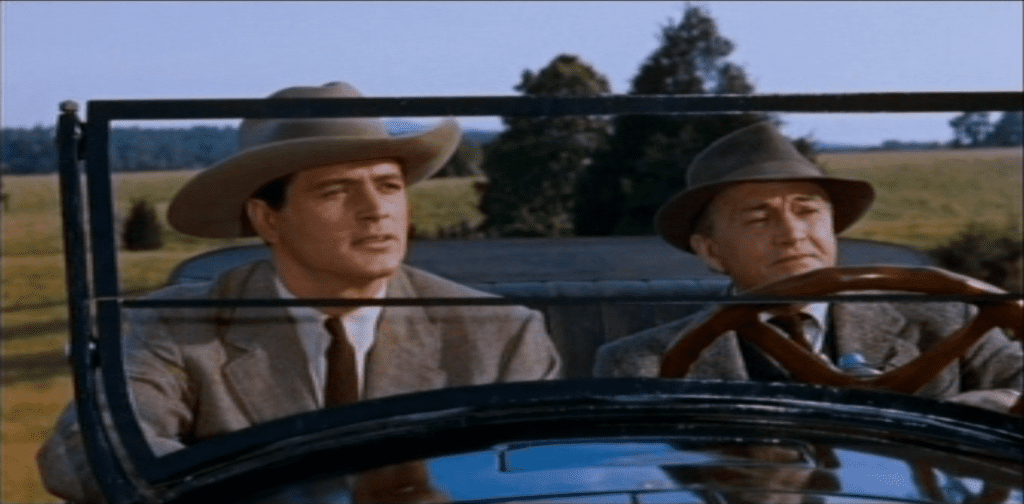
Bick: That is a beautiful animal (presumably he’s speaking collectively of both Leslie and War Winds)
Or rather the marriage therein, between Texan Bick Benedict (Rock Hudson), rich, powerful, and beautiful scion of a 595,000 acre ranch, and Leslie Lynnton (Elizabeth Taylor), daughter of an old money Maryland family. Giant spans 25 years, from their first meeting and hasty marriage, through their conflicts and commitment, and the movie’s conclusion, when they have become the “older generation,” happy to be at home babysitting their grandsons, relaxed with each other and close in a way they could never be in their passion and immaturity.
Giant is pretty close to Gone With the Wind good, a vast canvas of conflicts and change made relatable by this central relationship.
It’s easy to get sucked down a rabbit hole with a movie this grand and fertile—once you start digging into it, there are a lot of things worth writing about. I found myself so smitten with the character of Leslie and her splendid portrayal by the 23-year-old Taylor that I had to take a step back. Hopefully, some other time I can indulge that fascination and write Leslie Lynnton the appreciation she deserves.
But the marriage, which is the movie’s spinal column, with all the other story elements branching off from it, is very unusual for a Hollywood movie. I haven’t been able to think of another movie that follows a relationship this closely over this long a period. It’s not unusual to start with the first days of the romance, when things are lighthearted and sexy, and use that to set up a story that begins decades later, but leaves out all the stuff in between.
But the stuff in between, Stevens shows us, is not to be ignored. It’s in seeing how these two people, both indulged and confident, used to getting their own way, learn (or don’t) to do the seemingly impossible work of marriage: to commit to their partner for the long haul without ceding their own identity. Can they learn to honor the marriage without compromising themselves?
You already know the movie, right? If not, see it and let me know what you think.
If you’re new to it, here’s a plot synopsis to keep track of character names and plot points. I don’t mean to confuse, but there’s not world enough or time to provide all that context here: (insert link to imdb plot synopsis here)
https://www.imdb.com/title/tt0049261/plotsummary
Okay, let’s start at the beginning.
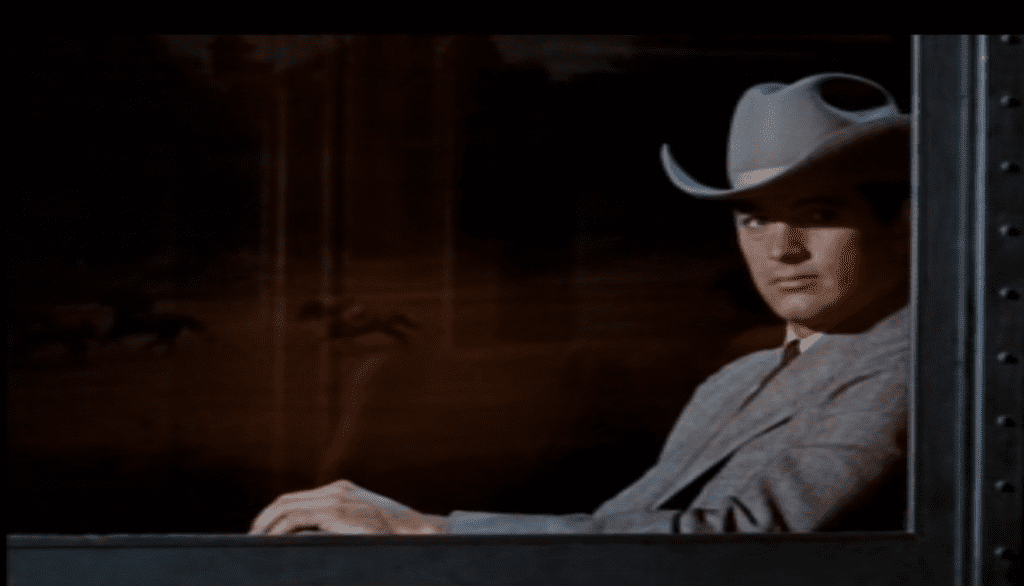
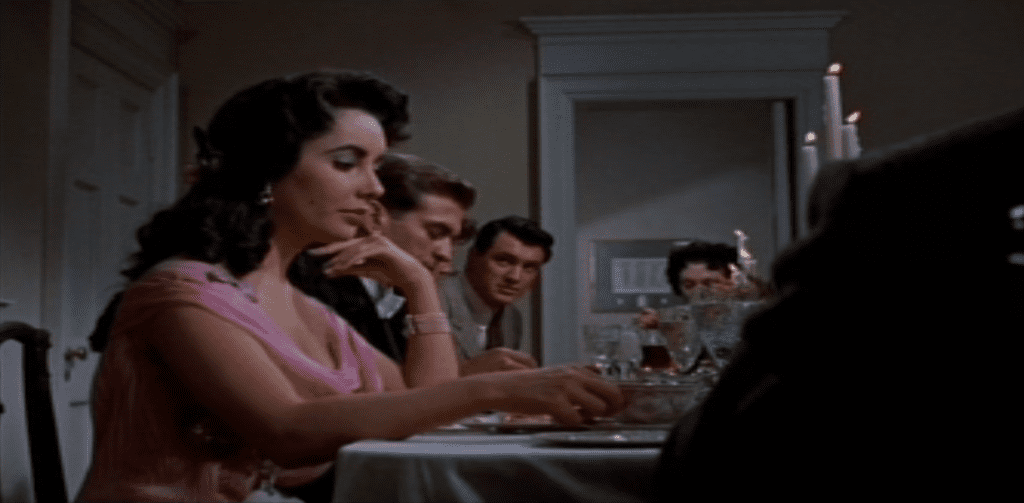
Stevens was so swell at showing rather complicated emotional stuff. Bick has come to Maryland to look at some of Dr. Lynnton’s horses. When Bick meets Leslie, you can feel how aware they are of each other physically. You know that feeling, when you are so turned on by somebody that you are in a heightened state just being in the same room with them, and you’re always acutely aware of exactly where they are, what’s going on with them? Both of them feel it instantly. Leslie is engaged to David (Rod Taylor, rrrrrrrr), but it’s clear that Bick intrigues her in a way David does not. David is part of Leslie’s world, and she wants something more challenging. She gets it, in spades.
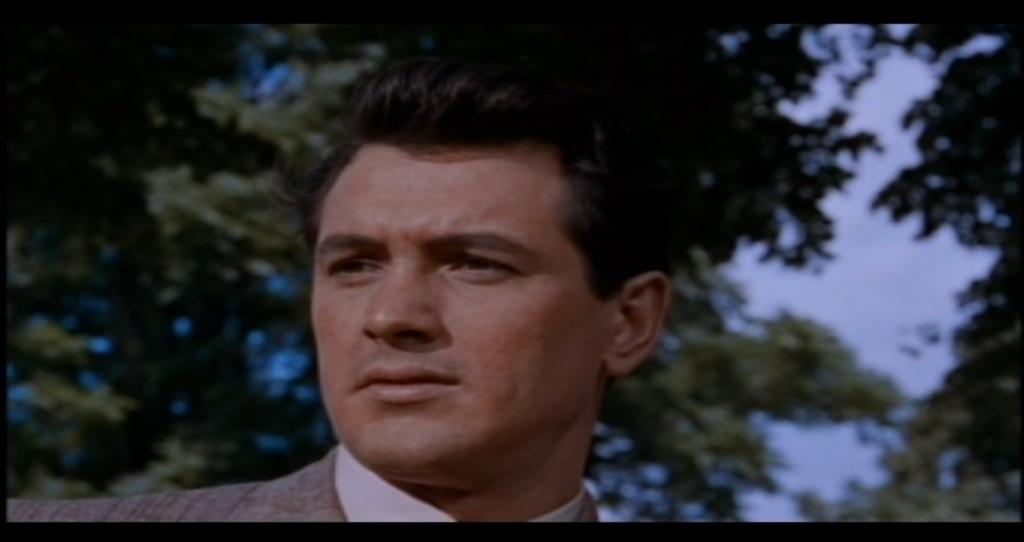
Bick in the throes of new love
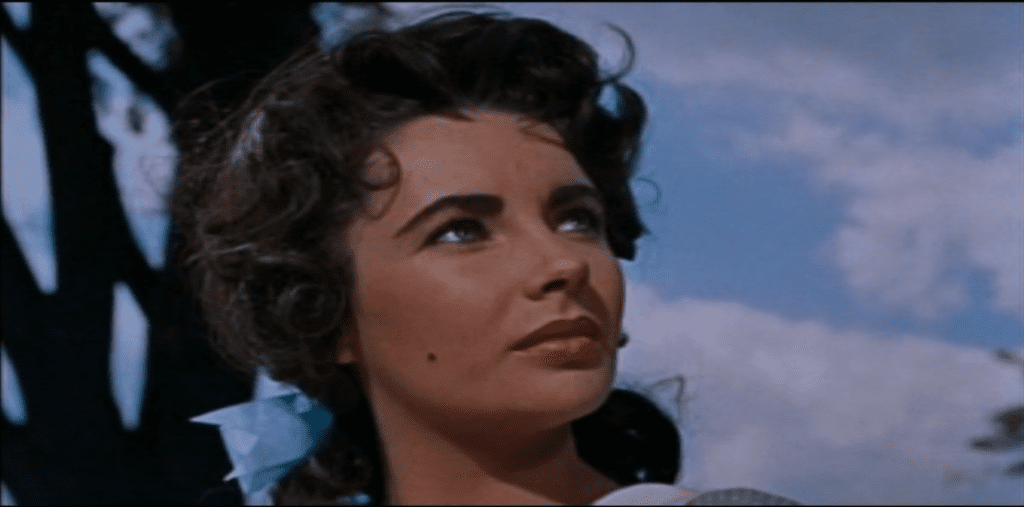
…Leslie, too
Leslie is dressed for the ball her parents are throwing that night. She listens for a minute as her mother makes polite, clueless conversation with Bick, who clearly feels very much an outsider in this lovely Eastern family, with their rolling, green land and stately house of small rooms. Then Leslie starts talking, saucy and flirtatious, challenging him: You a big enough man to take me on, Handsome?
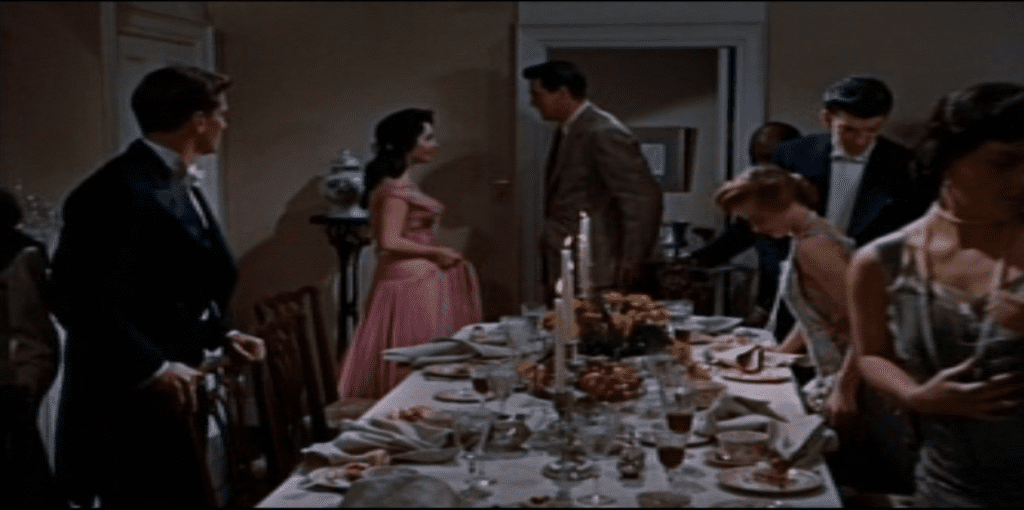
Leslie’s fiancé, David (Rod Taylor) watches as Leslie and Bick feel themselves drawn together.
After dinner, he follows her out to the porch, and they converse awkwardly, both clearly awash in hormones and excitement. We get that this is more than just sex, though of course it’s clearly that, too. But there is some greater yearning as well as a sense of mystery in the presence of the unknown and unfamiliar.
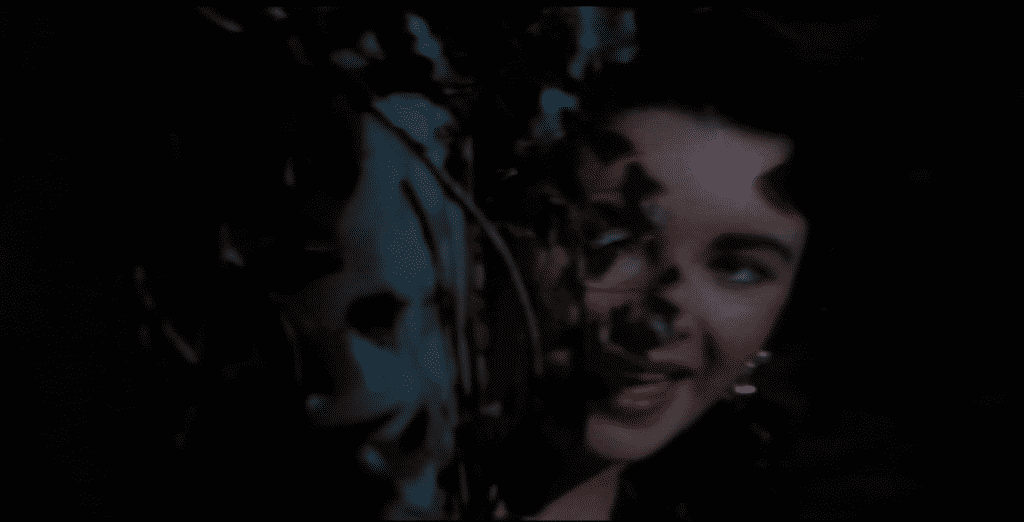
Leslie flirting with Bick on the porch
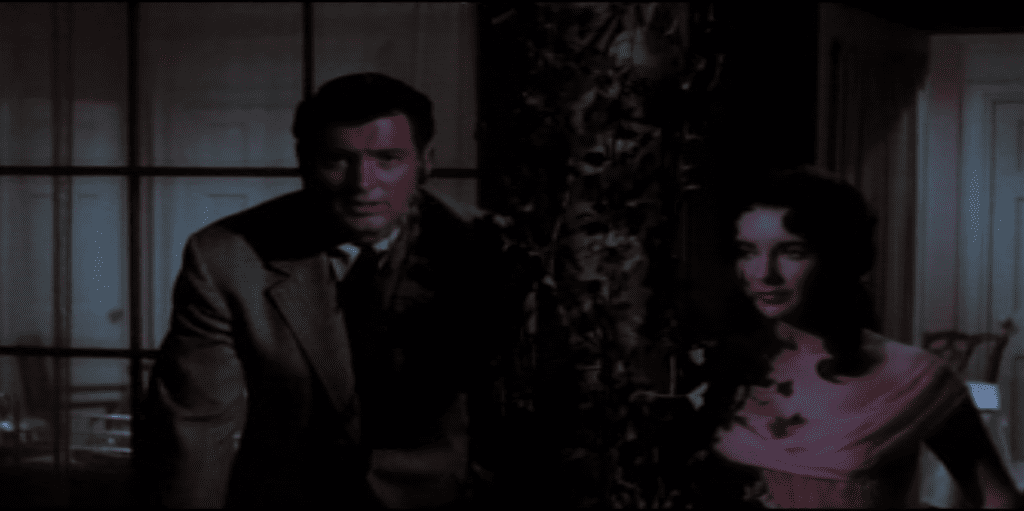
He goes to bed, she comes home early from the ball and spends the night reading about Texas. She has decided to marry him, and when her little sister asks if she can have David, she snaps something like “Yes, now get out of here!”
So much for being engaged. I’d be a little slower to toss away Rod Taylor, but she is drawn to the adventure of moving far from everything she’s ever known, and making that her home.
Bick, too, feels that awe of being in a place he’s never been before, not just physically but emotionally.
The traditional read of Giant is that Bick is a bigot (he is) and sexist (ditto) who changes over the course of the film because of Leslie, who refuses to stay in line or act like the women he knows.
I think it’s more interesting: He’s drawn to her because she *isn’t* safe or predictable. He could have married Vashti (the marvelous Jane Withers) or any other little old gal (btw, I grew up in Texas, and I never heard anyone use the expression “little old,” nor did my mother, who grew up in West Texas, just sayin’), but instead he marries a woman who is smarter than he is and just as tough, and who isn’t going to make herself smaller to avoid pissing him off.
Stevens doesn’t show us their wedding. We go straight from the Lynntons’, Bick and Leslie in an almost visible halo of infatuation at the fence, both petting her gorgeous horse War Winds.
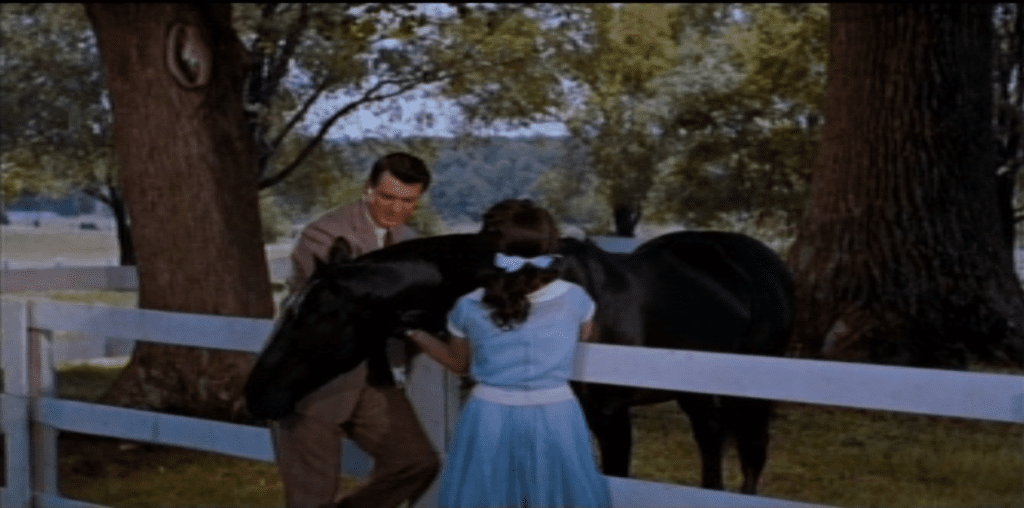
Of War Winds: The magnificent horse carries a lot of meaning. Watching Leslie ride him, seeing her rapport and affection for him, we’re told that he’s too wild, too much horse for anyone but her. Bick buys him anyway and ships him home on the same private railcar he brings his new bride home in.
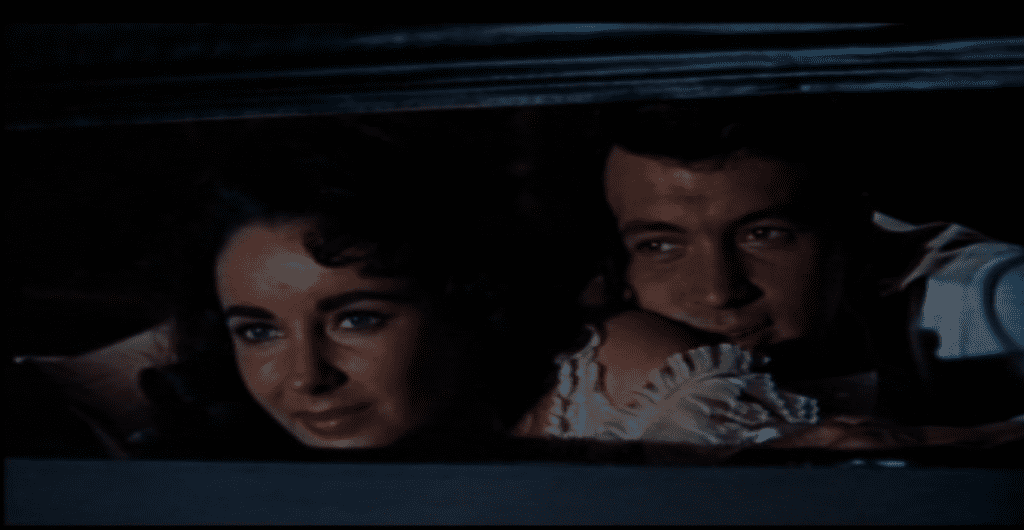
The newlywed Benedicts on his private rail car, headed for Texas, for Reata
At this point, the beginning of the marriage, Leslie and Bick are still enraptured by each other. The work of beginning a life has not yet begun, but we see that the honeymoon has gone well; they’re like little kids who share a secret.
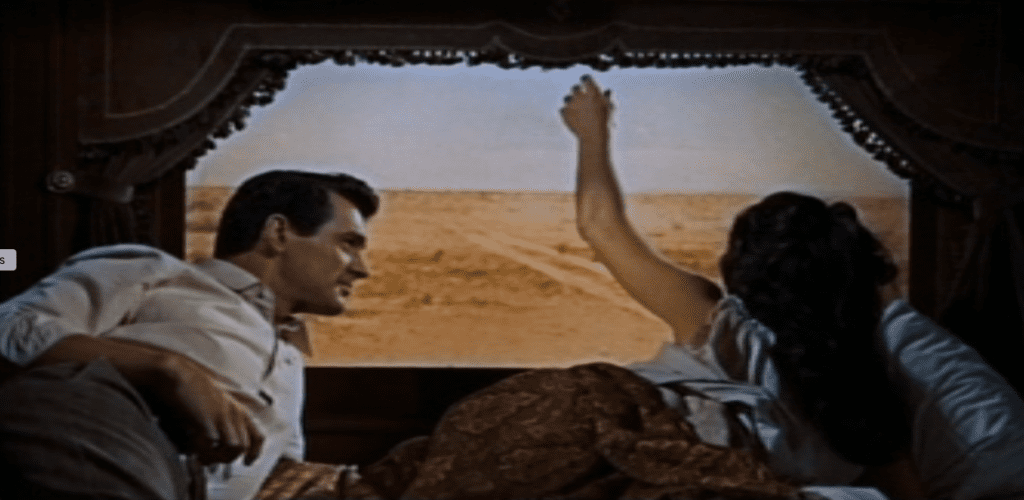
Leslie: Is this Texas?
Then two things happen: Leslie has her first meetings with the Mexican workers on the ranch and in her new house, a spooky-looking edifice that rises up alone on the prairie, that hasn’t been redecorated in about 50 years. And she meets her sister-in-law, Luz, a single gal whose life and identity are all based on her “running things,” including Bick and Leslie.
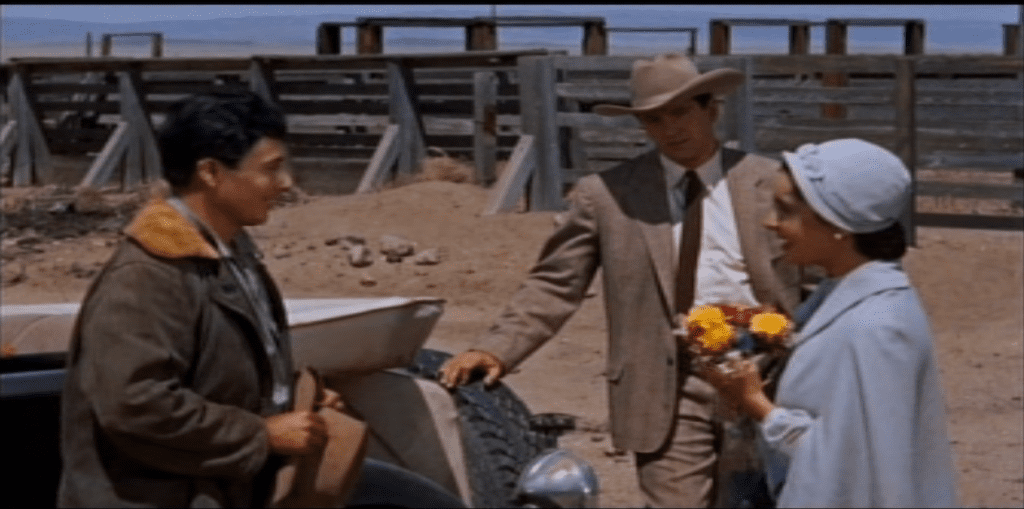
Leslie’s kindness to Angel Obragon rubs Bick the wrong way. And it’s only the beginning…
Bick is disturbed by Leslie’s kindness to Angel Obragon, who has brought her a little bouquet to welcome her, and to the women who keep house for the Benedicts.
Bick: You’re a Texan now, honey.
Leslie: Is that a state of mind? I’m still myself.
Bick: You’re my wife, honey. You’re a Benedict.
Leslie: I still have a mind of my own. Elsewhere, being gracious is acceptable.
All you movie lovers know an approaching storm when you see one. Leslie’s refusal to adopt her husband’s and his friends’ racist treatment of their workers and neighbors is an affront, a threat. Bick has married a woman who knows who she is, who like him comes from old money and has the casual confidence to show it—this is perhaps one of the things that they share. She will not compromise her morals to fit in, and he’s not going to like that. And that’s going to form the plot’s central conflict. There are others, but they all radiate out from the uneasy Leslie and Bick relationship.
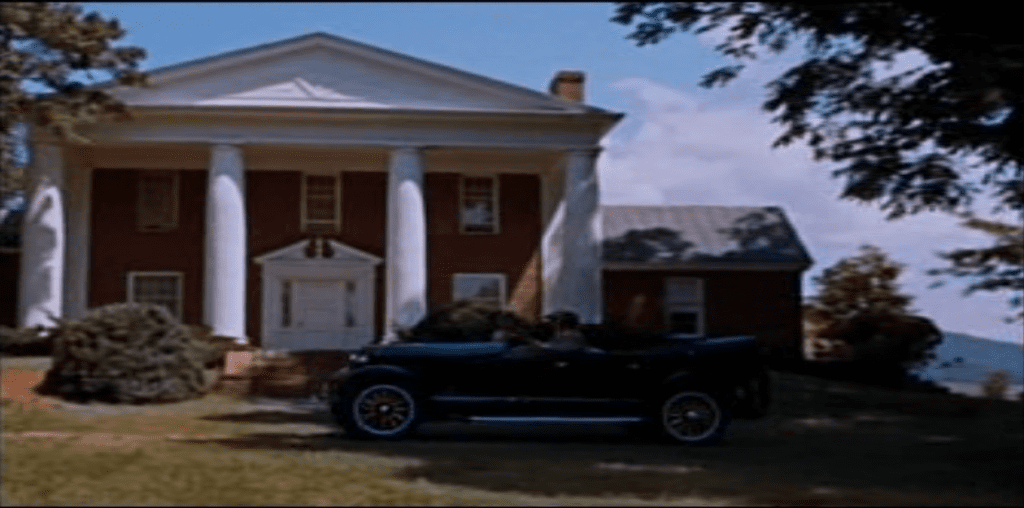
Leslie’s parents’ house in Maryland
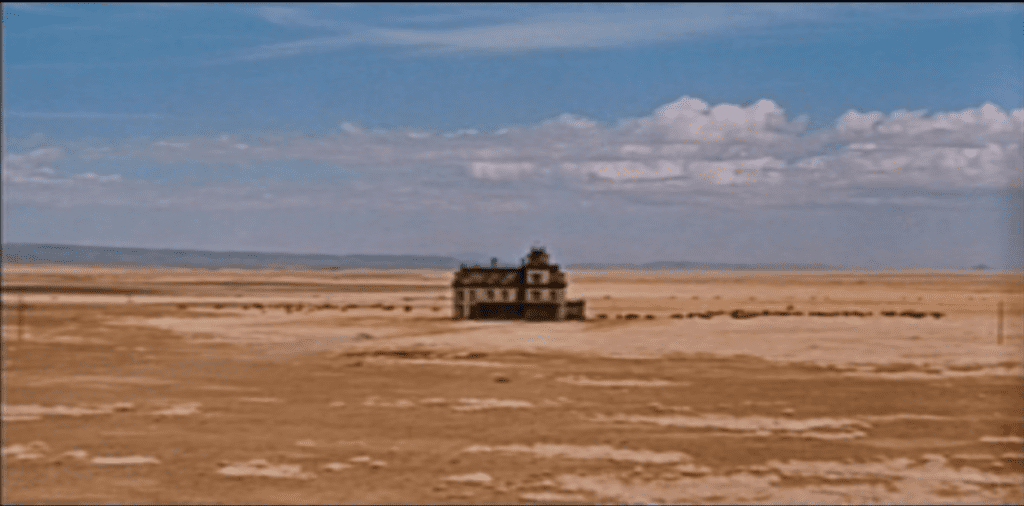
The Benedict house at Reata
Bick’s sister, Luz (Mercedes McCambridge), is also on high alert at the entrance of the stranger into what she naturally thinks of as her and Bick’s domain. Luz is single, tough, and takes great pride in her ability to bully their Mexican employees. She believes they’d “sit on their honkers all day” if she didn’t terrorize them.
Luz has no grace to offer Leslie, only a reproach that they’ve been so long getting there during spring roundup. This after she walks in on them just after Bick has carried Leslie over the threshold, the two giggling and kissing. Then she tries to put them into separate bedrooms at opposite ends of the hall. Bick refuses, saying sheepishly, “We’re married, Luz…. You know how it is,” (though no, she doesn’t) while they both grin at the mortified Luz.
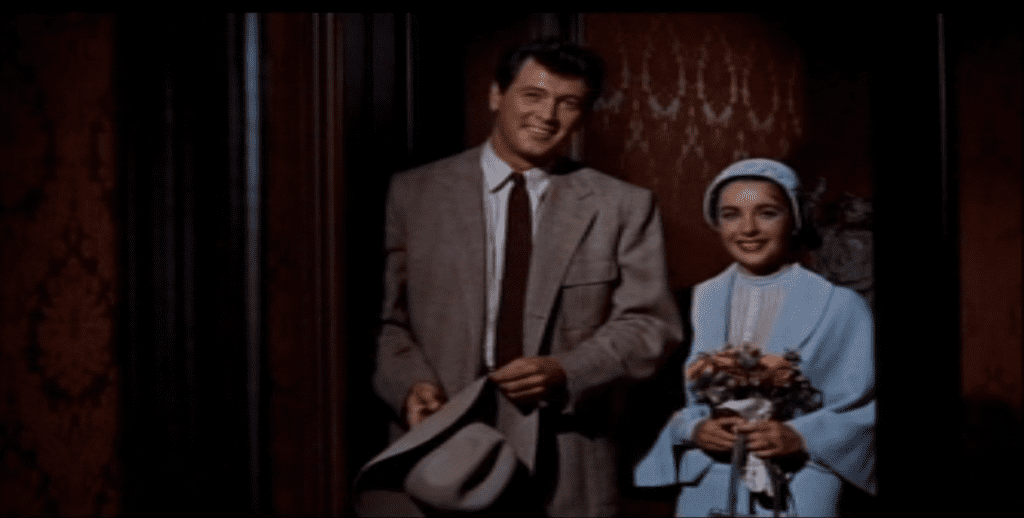
The whole movie could have taken a very different turn if Bick, instead of matter-of-factly making it clear he and his wife will not be sleeping 50 feet apart, had been torn, feeling Luz’s agony, and told Leslie they should do as Luz says, just until she adjusts to them being married. That would have put the marriage off on a wrong foot, with Leslie the outsider in her own home, and I don’t think it would have been long until she went home to Maryland.
But impressively, he stands up for Leslie and their marriage, and it is the first indication that these two might have a chance.
Luz keeps swinging, telling a polite but nonplused Leslie that her blood is too thin, but “You don’t have to do a thing. This rich Texas air will fix you up.” (Leslie’s blood is just fine, she doesn’t need any fixing up, and she’s not about to be characterized as some fragile little bird, thank you very much.) Luz has Leslie’s breakfast brought in, an indigestible pile of blood sausage, eggs, a yellow lump that might be cheese or butter. Leslie is horrified, in a genteel way, but politely nibbles. When Leslie faints at the barbecue later that day, Luz is thrilled.

Breakfast a la Luz (old style)
But it’s short-lived. Leslie knows Bick and Luz eat breakfast together every morning at 5am. She gets up early enough to supervise breakfast preparations herself, and triumphantly rings the “come and get it” dinner bell to summon them to breakfast. It’s a very different meal that includes grapefruit halves with maraschino cherries in the center, much less heavy than that mess Luz had served Leslie the day before.
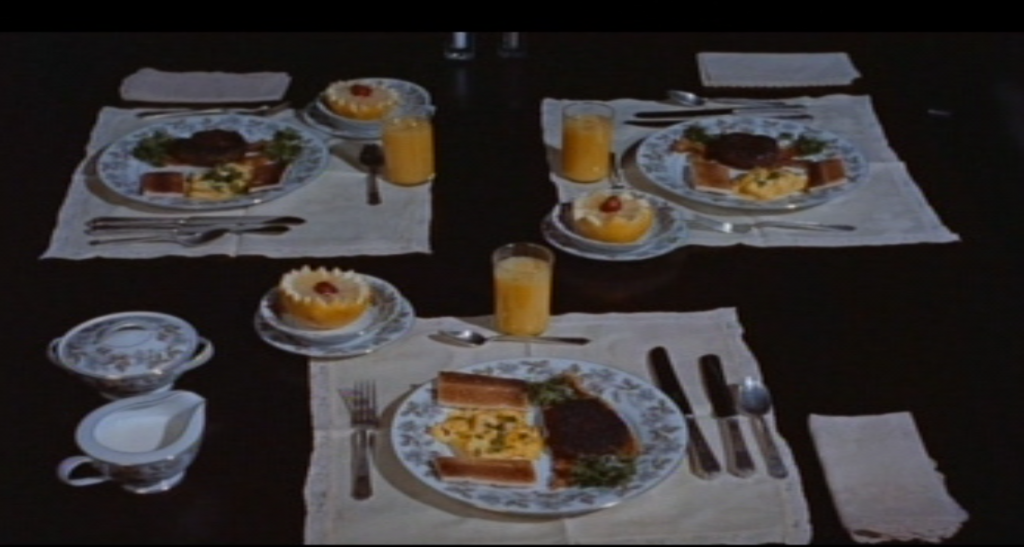
Leslie’s revised breakfast as she takes over the household at Reata
Luz is distraught. The interloper has already taken her brother, and now she’s taking over “her” house. She appeals to Bick, but again, he refuses to be drawn into a conflict. He mildly tells her of course he’s not “setting up against her,” but says, “That gal’s my wife,” and that he expects her to be fair enough to treat her properly.
I feel for Luz. Her whole identity is being trampled, and she lacks the internal resources to change. The only thing she can think of to settle herself is to terrorize somebody, and unfortunately that somebody is War Winds. Despite being warned that nobody rides him but Leslie, Luz mounts him, saying something like “I guess you’re going to tell me how to run things, too,” digging her spurs into his sides as hard as she can, making him cry out in pain.
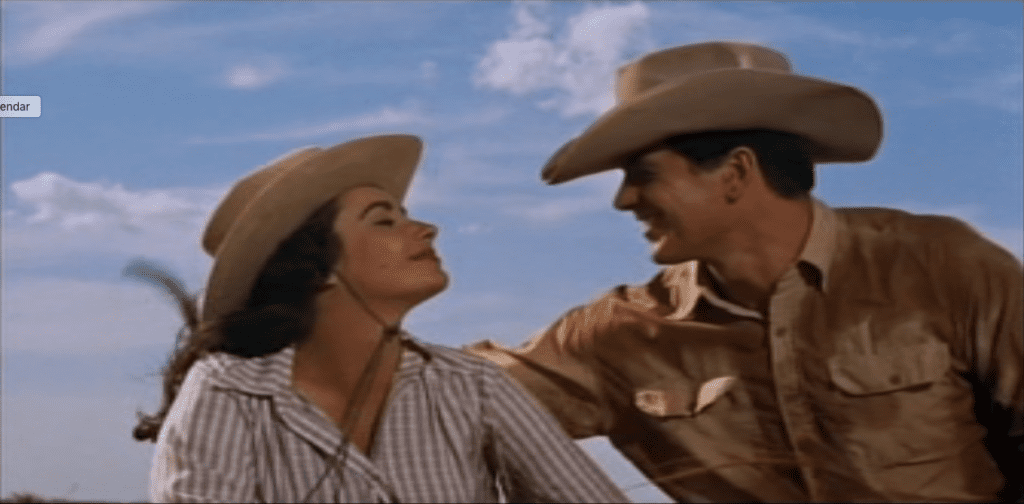
Leslie and Bick don’t know their honeymoon is about to end in tragedy.
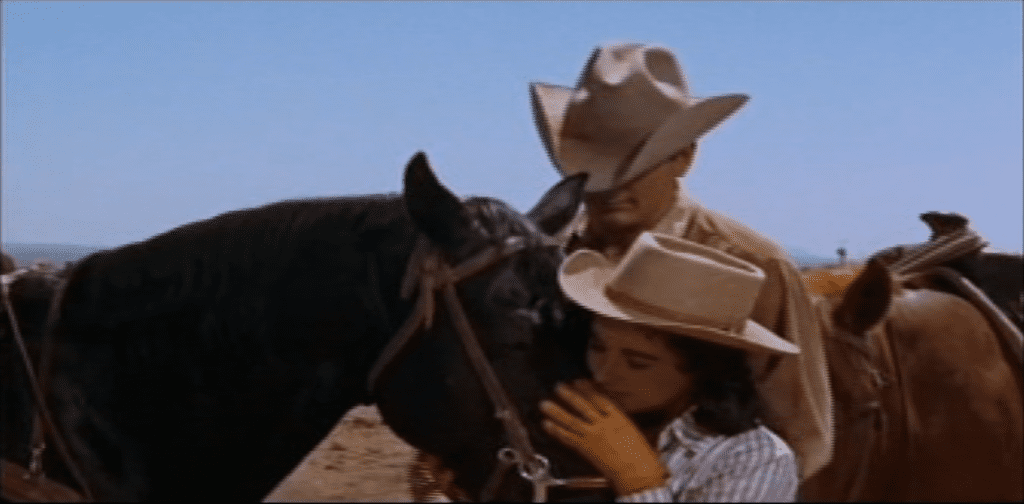
Leslie doesn’t know this is one of her last moments with her beloved horse
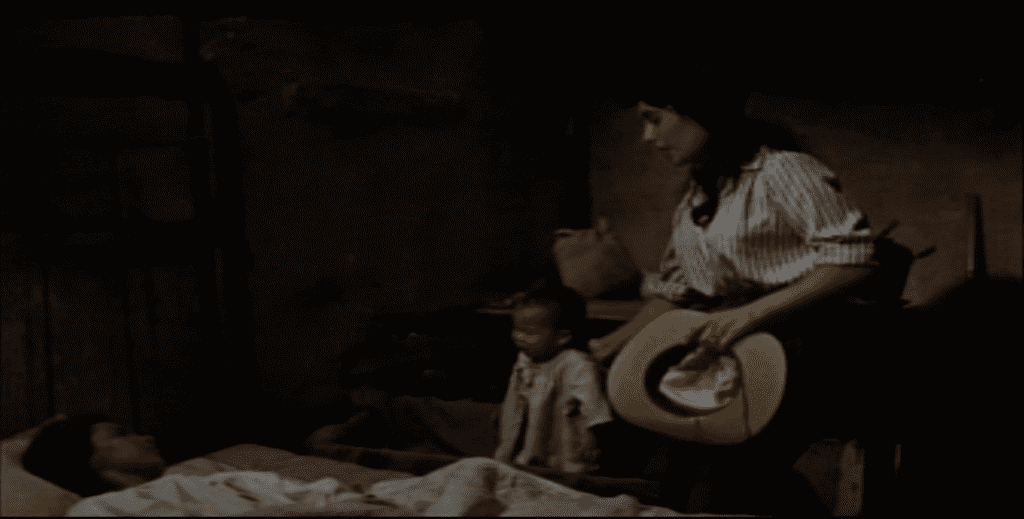
Leslie finds her own work, advocating for the poor laborers of Reata, nursing little Angel Obragon and his mother
War Winds limps home to Reata, and when Leslie gets home from finding her own work, as an advocate for the Mexicans who live in squalor in Vienticito, left to manage as best they can without any kind of sewers, running water, electricity, access to a doctor—Luz lies dying on the couch. They found her head split open from a mesquite stump after War Winds, bless his heart, had finally succeeded in throwing her. She dies quickly, and the shot of her feet, still in their boots, as she is covered up, reminds me of the Wicked Witch of the East’s feet sticking out from Dorothy’s house.

Luz (Mercedes McCambridge), determined to exercise power over somebody, unwisely chooses War Winds
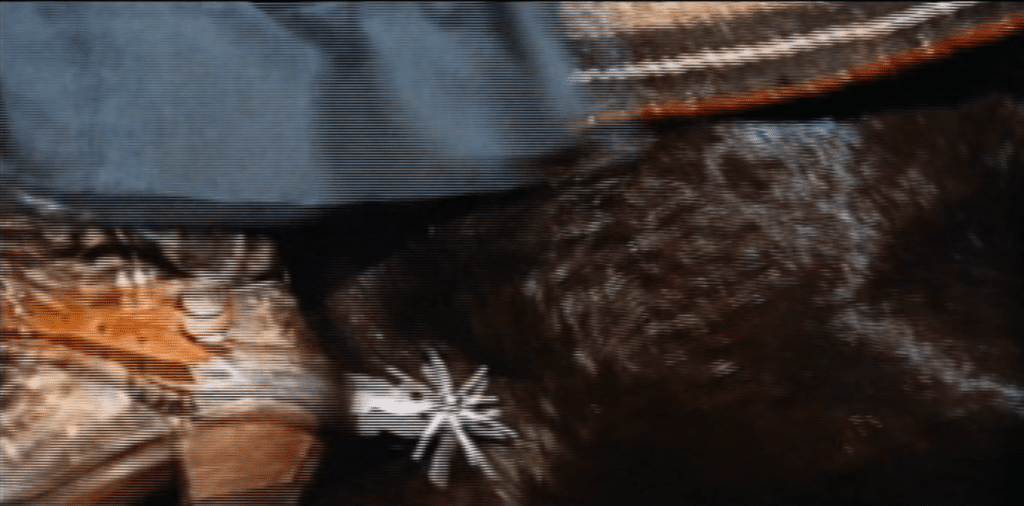
Luz’s spurs, digging into War Winds
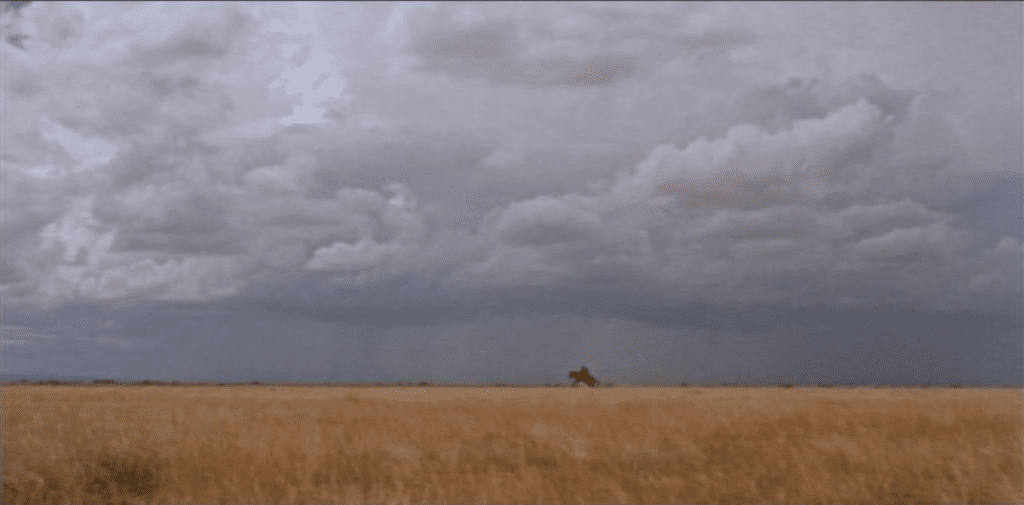
Luz abusing War Winds until he throws her to her death
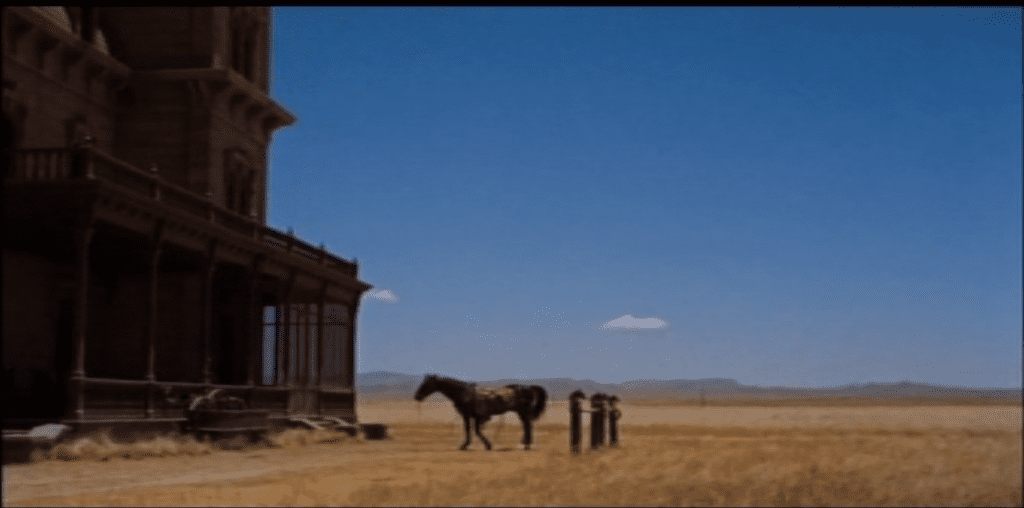
Poor War Winds limps home
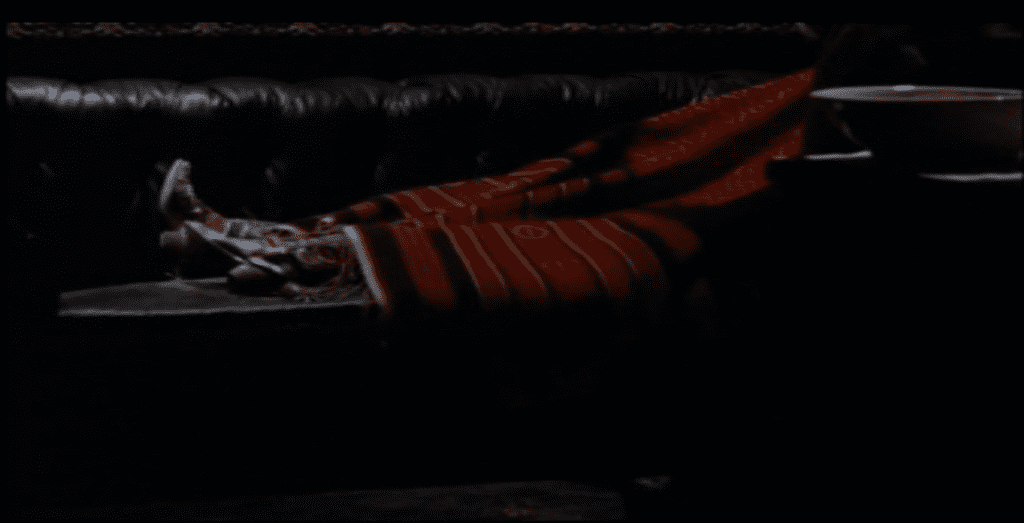
Luz’ dead feet, still booted, as her body is covered
War Winds has suffered an inoperable broken bone, and Bick has shot him.
This marks the end of the honeymoon, as well as the sexually playful moment in their relationship. As Marilyn Ann Moss points out in Giant: George Stevens, a Life on Film, War Winds embodied Leslie’s sexuality. His death signals an end to sexuality in the movie, pretty much all around. The closest we get is Jett Rink (James Dean) creepily sliming Leslie with his compliments, which get more brazen as his drinking develops, until he says, practically licking his lips, “You look good enough to eat,” which leaves Bick no choice but to slug him. Bick has been waiting years for a good reason to slug Jett, but that’s for another piece.
But Leslie assumes a new role, now that her sexual flame has been effectively extinguished. She becomes the mother figure, the benevolent authority figure who will move Reata and all within its vast area, including Bick, into the 20th century.
Twenty years later, we see Judy Benedict, one of Bick’s and Leslie’s twins, with her just-drafted husband, Bob, kissing in the car before going into the darkened house together, emerging in the morning with him buttoning his shirt. That’s as hot as it gets.
As a matter of fact, the degree to which sexuality is absent in the rest of the movie is itself noteworthy.
I’m telling you, I could keep on writing about Giant for ages, there’s so much to explore and say. Hopefully, I’ll be able to return to it and explore some of the many other fascinating aspects.
But for now, I hope I’ve gotten you interested either in a first viewing or a re-viewing. Like all great movies, this one rewards repeat viewings. The very unusual exploration of a marriage over a long period is only one area worthy of our attention.
We’ve only covered about the first hour, not quite to the end of Act I.
This post was written for the Wedding Bells Blogathon, hosted by Hometowns to Hollywood. Check out the other posts here. It’s a mitzvah!


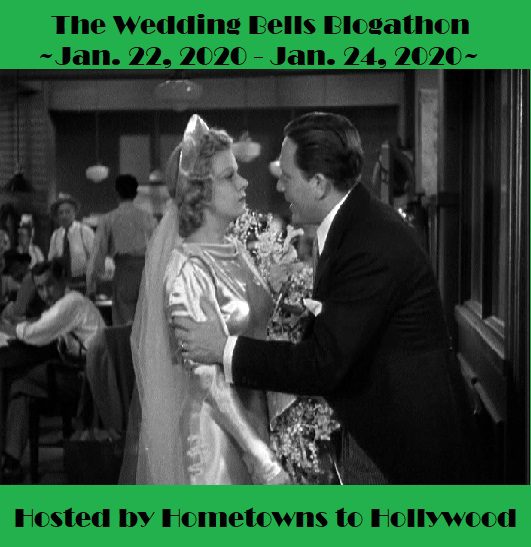

GREAT insights and analysis!
thank you kindly!
I have been really unfair to this film. I’ve tried watching it and couldn’t connect with it, although there’s much to admire about it. But your review has made me re-think it entirely, and now I’m going to give it another go with a new perspective. Thank you for that.
What a great choice for this blogathon! Giant is a fabulous story centralizing upon an relationship that is certainly put to the test. Thanks for participating!
Dear Lesley,
This is a great article! I have heard of this film before by title only, so it was really interesting for me to read your summary of it. Your analysis of the marriage as the center of this film is really interesting. I enjoyed reading it.
By the way, I nominated you for The Sunshine Blogger Award: https://pureentertainmentpreservationsociety.wordpress.com/2020/04/27/the-sunshine-blogger-award-from-sally-silverscreen/. In this post, I also invited you to participate in my monthly guest series, What the Code Means to Me. I look forward to hearing from you!
Yours Hopefully,
Tiffany Brannan
Thank you kindly, Tiffany, so glad you liked the piece!
Jeepers, I beg you pardon for taking almost a solid year to respond—this poor website and my writing are gathering dust, and of course it’s been such a difficult years…. Appreciate your nomination for Sunshine Blogger but pretty sure I did it a few years ago.
If you’re still doing the monthly series, I’ll have a look and a think and see if I can come up with anything for it. Thank you very much for thinking of me.
(And again, I am very sorry to be so remiss in looking at comments!
Did bick’s daughter marry Jeff rink ?
no, Leslie says in the last scene when she’s on the phone with Vashti that Luz has gone out to Hollywood. the implication is that she’s over her infatuation with Jett.